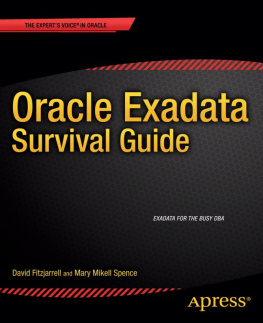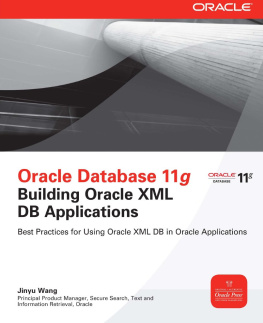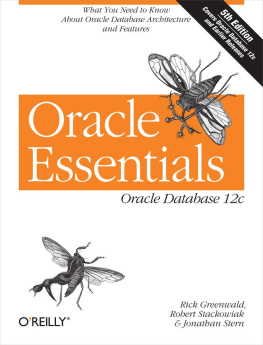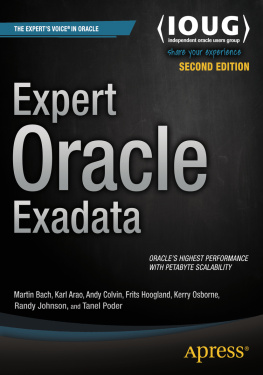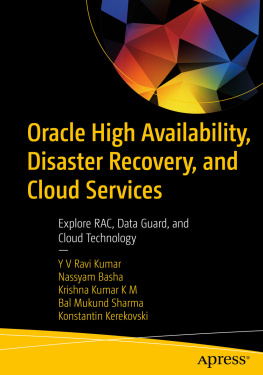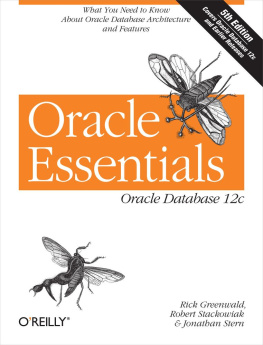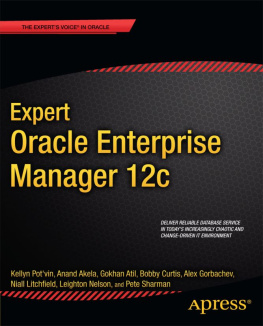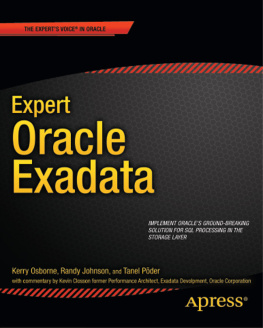David Fitzjarrell - Oracle Exadata Survival Guide
Here you can read online David Fitzjarrell - Oracle Exadata Survival Guide full text of the book (entire story) in english for free. Download pdf and epub, get meaning, cover and reviews about this ebook. year: 2013, publisher: Apress, genre: Romance novel. Description of the work, (preface) as well as reviews are available. Best literature library LitArk.com created for fans of good reading and offers a wide selection of genres:
Romance novel
Science fiction
Adventure
Detective
Science
History
Home and family
Prose
Art
Politics
Computer
Non-fiction
Religion
Business
Children
Humor
Choose a favorite category and find really read worthwhile books. Enjoy immersion in the world of imagination, feel the emotions of the characters or learn something new for yourself, make an fascinating discovery.
- Book:Oracle Exadata Survival Guide
- Author:
- Publisher:Apress
- Genre:
- Year:2013
- Rating:5 / 5
- Favourites:Add to favourites
- Your mark:
Oracle Exadata Survival Guide: summary, description and annotation
We offer to read an annotation, description, summary or preface (depends on what the author of the book "Oracle Exadata Survival Guide" wrote himself). If you haven't found the necessary information about the book — write in the comments, we will try to find it.
Oracle Exadata Survival Guide is a hands-on guide for busy Oracle database administrators who are migrating their skill sets to Oracles Exadata database appliance. The book covers the concepts behind Exadata, and the available configurations for features such as smart scans, storage indexes, Smart Flash Cache, hybrid columnar compression, and more. Youll learn about performance metrics and execution plans, and how to optimize SQL running in Oracles powerful, new environment. The authors also cover migration from other servers.
Oracle Exadata is fast becoming the standard for large installations such as those running data warehouse, business intelligence, and large-scale OLTP systems. Exadata is like no other platform, and is new ground even for experienced Oracle database administrators. The Oracle Exadata Survival Guide helps you navigate the ins and outs of this new platform, de-mystifying this amazing appliance and its exceptional performance. The book takes a highly practical approach, not diving too deeply into the details, but giving you just the right depth of information to quickly transfer your skills to Oracles important new platform.
- Helps transfer your skills to the platform of the future
- Covers the important ground without going too deep
- Takes a practical and hands-on approach to everyday tasks
- Learn the components and basic architecture of an Exadata machine
- Reduce data transfer overhead by processing queries in the storage layer
- Examine and take action on Exadata-specific performance metrics
- Deploy Hybrid Columnar Compression to reduce storage and I/O needs
- Create worry-free migrations from existing databases into Exadata
- Understand and address issues specific to ERP migrations
Oracle Exadata Survival Guide is for the busy enterprise Oracle DBA who has suddenly been thrust into the Exadata arena. Readers should have a sound grasp of traditional Oracle database administration, and be prepared to learn new aspects that are specific to the Exadata appliance.
Table of Contents- Exadata Basics
- Smart Scans and Offloading
- Storage Indexes
- Smart Flash Cache
- Parallel Query
- Compression
- Exadata Wait Events
- Measuring Performance
- Storage Cell Monitoring
- Monitoring Exadata
- Storage Reconfiguration
- Migrating Databases to Exadata
- Migrating ERP Applications
- Final Thoughts
David Fitzjarrell: author's other books
Who wrote Oracle Exadata Survival Guide? Find out the surname, the name of the author of the book and a list of all author's works by series.

